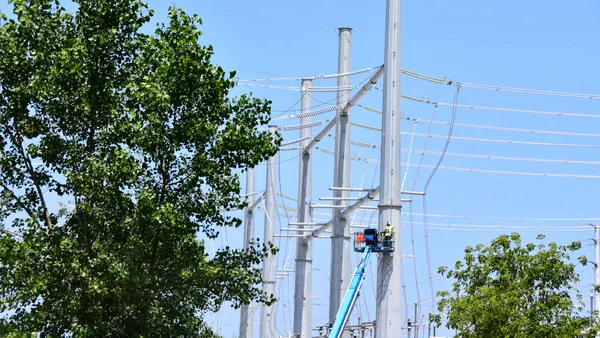Dive Brief:
- The Public Utilities Commission of Nevada (PUCN) unanimously approved a new solar net metering policy that decreases the rate paid to rooftop solar customers for the power they export to the grid from the retail rate of the electricity to the wholesale rate. The change would retroactively apply to all solar customers.
- The policy creates a seperate rate class for all small commerical and residential net metering customers and a time-of-use pricing option for all. It would also include an increase in fixed charges alongside a decrease in the volumetric commodity charge designed to recoup costs from net metering customers.
- NV Energy has seven days within the effective order of the date to file the new rates, which will be implemented gradually over four years. The regulations are effective on Jan. 1 2016.
Dive Insight:
Nevada's utility regulators unanimously approved new regulations for small commerical and residential net metering customers, which solar advocates say will significantly decrease the resource's deployment in the state. At least two major solar developers have pulled installation operations or threaten to do so if the proposed draft order was approved.
Nevada's solar market has grown quickly in recent years, setting off a fierce debate between the state's major utility NV Energy and solar advocates as the rapid expansion of solar installations maxed out the state's 235 MW net metering cap earlier this summer.
The state's legislature directed utility regulators in May to come up with a new solar tariff satisfactory to both sides by the end of the year. NV Energy, the state's dominant electric utility, proposed to lower the remuneration rates for solar customers and increase fixed fees, arguing that net metered customers don't pay their fair share to maintain the grid.
The new net metering policies are retroactive, which means they apply to all net metering customers regardless of when they installed their PV systems. Solar advocates decried that decision and the move to make it retroactive, saying it ignores the needs of the solar industry.
SolarCity CEO Lyndon Rive, who had testified in hearings in Nevada earlier this year on the net metering issues, said that SolarCity would leave Nevada if the PUC approved the draft order issued yesterday.
"It will destroy the rooftop solar industry in one of the states with the most sunshine...There is so much wrong with the decision, the only option for the PUC is to reject it," Rive wrote to Bloomberg. "The one beneficiary of this decision would be NV Energy, whose monopoly will have been protected."
SolarCity has not confirmed whether or not it will follow through on its threat to exit the state. Tesla Motors, Inc., whose CEO Elon Musk is the Chairman of SolarCity, chose Nevada as the site to built its huge Gigafactory that will manufacture its highly-anticipated battery packs.
Earlier this month, third-largest solar developer Sunrun filed a lawsuit against Nevada Governor Brian Sandoval (R), seeking text messages between him and lobbyists for NV Energy about the state's net metering policy debate.
Stakeholders anticipated hitting the net metering cap by early 2016, despite warnings by The Alliance of Solar Choice (TASC) that the rapid pace of solar PV installations would mean the cap would be hit earlier than the projected timeline.
The net metering cap was reached in August, temporarily halting solar installations, with Vivint Solar withdrawing its operations from the state. The PUC, which earlier had rejected solar advocates' pleas to extend the cap saying it was under the legislature's purview, voted unanimously keep current rates in place through the end of the year.












